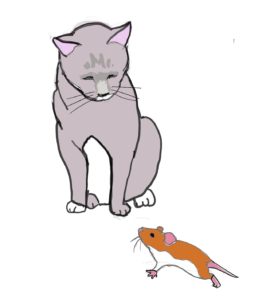 If you search for “monoclonal antibodies”, most of the search results are about COVID-19 and its variants. But did you know that monoclonal antibodies form the basis of the newest treatment for arthritis in cats? This new treatment is called Solensia. Solensia is a monthly injection for arthritic cats that won FDA approval this month. It should be available through your veterinarian later this year.
If you search for “monoclonal antibodies”, most of the search results are about COVID-19 and its variants. But did you know that monoclonal antibodies form the basis of the newest treatment for arthritis in cats? This new treatment is called Solensia. Solensia is a monthly injection for arthritic cats that won FDA approval this month. It should be available through your veterinarian later this year.
arthritis in cats: a tale of biotech and a chinese hamster
what are monoclonal antibodies?
- Monoclonal: refers to a cell or organism that comes from a single individual or cell.
- Antibodies are proteins in the blood that our immune system produces to counteract a foreign substance such as a bacteria or virus (think COVID-19).
antibodies and the immune system
Immune cells in our bodies called B-lymphocytes mount a response to a foreign substance or antigen (e.g. a virus), binding to it and deactivating it. The presence of the antigen and immune cells called T cells activate the B-cells. The B cells then propagate and release antibodies that are able to bind to and deactivate the specific antigen that stimulated their formation!
Monoclonal antibodies are derived from clones or copies of activated B cells. They can be harvested and grown in the laboratory and used to fight infections caused by the antigen they were developed to target.
Where do monoclonal antibodies come from?
- Blood cells from convalescing patients: Due to the large numbers of convalescing COVID patients, there was a ready source of blood cells containing B-cells with antibodies to COVD 19 that could be used to make monoclonal antibodies to treat newly infected patients.
- Transgenic mice: Mice that have been genetically altered to carry human antibody genes instead of mouse antibody genes are the usual source for monoclonal antibodies. These mice can be injected with a specific antigen and produce fully human antibodies that can be used by human patients to combat that antigen. Being human antibodies, they are less likely to be rejected by the human immune system.
Arthritis in cats: using monoclonal antibodies
Nerve growth factor (NGF) is a protein that is key to the development and survival of nerve cells or neurons, particularly sensory neurons that transmit pain, temperature, and touch sensations.
When NGF binds to pain receptors inside the sensory neuron, a series of events is triggered that ultimately sends a “pain” signal to the brain.
Instead of binding to a structure on a virus, monoclonal antibodies can be developed to recognize and attach to NGF, preventing NGF from binding to the pain receptors on the sensory neruron, blocking the pain signal.
Motion is Medicine
A reduction in pain means our arthritic cats will be more likely to move around more. Increased mobility will strengthen the cat’s muscles, so they can better support and assist the deteriorating joints. Increased activity and reduced pain result in a better quality of life.
Biotech Magic
The active ingredient in Solensia is frunevetmab, a monoclonal antibody that targets NGF. The antibodies are sourced from Chinese hamster ovary cells. Like the mice that have human antibodies instead of mouse antibodies, the hamster cells are “felinised”using recombinant biotechnology. Sections of the hamster antibodies are replaced with their feline counterparts. “Felinization” ensures that the cat’s immune system will not reject the monoclonal antibodies but allow them to function as part of the cat’s immune system.
Of cats and hamsters: no hamsters harmed
Frunevetmab is sourced from the cells of Chinese hamster ovaries. In fact, cells from an individual Chinese hamster, harvested back in the 1950s, produced the cell line which dominates biotechnology today. These cells are easy to propagate and maintain in the lab, providing a ready source of monoclonal antibodies.
multimodal therapy for arthritis in cats
Solensia is a pain medication and does not directly aid in preserving the synovial tissues. Most likely, Solensia will be part of a multimodal treatment that will include drugs and supplements like Adequan or glucosamine that are thought to help maintain synovial tissues in addition to weight loss and exercise.
Unlike other arthritis pain treatments such as NSAID’s, monoclonal antibodies are eliminated in the same way other proteins are, with minimal effect on the kidneys and liver, a concern for our cats with Chronic Kidney Disease.
Treatment using Solensia will consist of monthly injections under the skin. Most cat owners can become proficient in giving subcutaneous injections and treatment can be done in the safety and comfort of the cat’s home.
Thanks to a Chinese hamster years ago and advances in biotechnology, our cats may be able to spend their “ golden years” without pain from osteoarthritis!
Want to keep up with the world of cats? Subscribe to The Feline Purrspective!



Karen Gifford says:
This was so interesting. Experiencing cats later in life not able to function because of arthritis is sad and to know this is an alternative medication to really provide a better quality of life as they age is wonderful. Thank you for this very well researched information.
felinepurrspective_u3q4o6 says:
Thanks for your feedback, Karen – it is good to hear what people who are not animal professionals think! Thanks for reading The Feline Purrspective!
Susan says:
When will cats’ people be allowed to give our cats Solensia at home? I am an elderly person living on a fixed income and the monthly vet visits are not only very expensive, the journey to and from the vet clinic is very hard on my elderly cat. I could give Adequan subcutaneous injections at home, so why can’t we give Solensia injections at home too? It would save stress on my cat, and money for me.
felinepurrspective_u3q4o6 says:
Hi Susan,
Solensia is not a controlled substance and if you are up to date on your exams, labwork, etc. it would be up to your vet to decide if he/she is comfortable sending it home. It is still a relatively new treatment in the US, so perhaps there is still some concern about reactions to the injection, and, hence, the concern about sending it home.
Talk to your vet and let him/her know your concerns. Perhaps, there is an arrangement you can make.